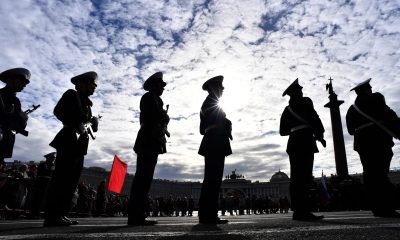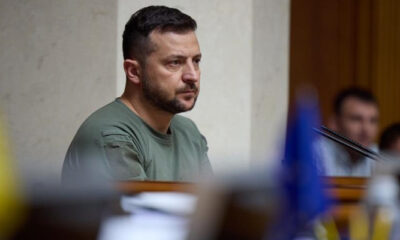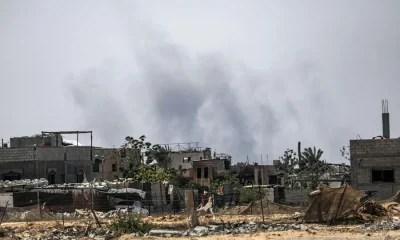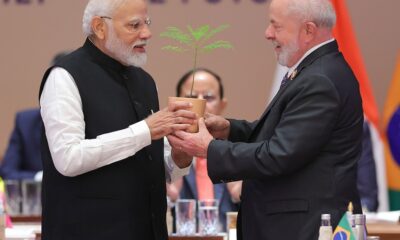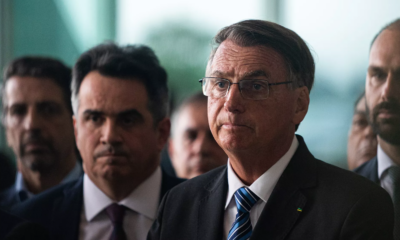International
G7 Foreign Ministers to meet near Rome for talks on Middle East and Ukraine

The foreign ministers of the G7 will meet on Monday near Rome for two days of talks on the Middle East conflict, in the presence of regional counterparts, as well as on the war in Ukraine.
The meeting, which will take place in the towns of Fiuggi and Anagni, will discuss several topics, including the arrest warrants issued by the International Criminal Court (ICC) against Israeli Prime Minister Benjamin Netanyahu, his former Defense Minister Yoav Gallant, and the head of Hamas’s military wing, Mohamed Deif.
The gathering will begin Monday afternoon with the presence of U.S. Secretary of State Antony Blinken.
The first session will be dedicated to the situation in the Middle East and the Red Sea, five days after the United States vetoed a UN Security Council resolution for a ceasefire in Gaza.
“The discussions with our partners will focus on how to support efforts for a ceasefire in Gaza and Lebanon, humanitarian initiatives for the affected populations, and the promotion of a credible political horizon for regional stability,” the Italian Ministry of Foreign Affairs said in a statement.
Italy, which holds the rotating presidency of the G7 (comprising Germany, Canada, the United States, France, Italy, Japan, and the United Kingdom), has included a dialogue session with ministers from Saudi Arabia, Egypt, Jordan, the United Arab Emirates, and Qatar, as well as the Secretary General of the Arab League, Ahmed Aboul Gheit.
On Tuesday, the second day will focus on the war in Ukraine and the situation in the Indo-Pacific region, with the participation of ministers from several Asian countries.
International
U.S. Senate Rejects Budget, Bringing Government Closer to Shutdown Amid DHS Dispute

The U.S. Senate voted on Thursday against a budget proposal in a move aimed at pressuring changes at the Department of Homeland Security (DHS), following the killing of two civilians during a deployment of immigration agents in Minneapolis.
All Senate Democrats and seven Republican lawmakers voted against the bill, which requires 60 votes to advance, pushing the country closer to a partial government shutdown that would cut funding for several agencies, including the Pentagon and the Department of Health.
The rejection came as Senate leaders and the White House continue negotiations on a separate funding package for DHS that would allow reforms to the agency. Proposed measures include banning Immigration and Customs Enforcement (ICE) agents from wearing face coverings and requiring them to use body-worn cameras during operations.
The vote took place just hours after President Donald Trump said he was “close” to reaching an agreement with Democrats and did not believe the federal government would face another shutdown, following last year’s record stoppage.
“I don’t think the Democrats want a shutdown either, so we’ll work in a bipartisan way to avoid it. Hopefully, there will be no government shutdown. We’re working on that right now,” Trump said during a Cabinet meeting at the White House.
International
Trump Says Putin Agreed to One-Week Halt in Attacks on Ukraine Amid Extreme Cold

U.S. President Donald Trump said on Thursday that he secured a commitment from Russian President Vladimir Putinto halt attacks against Ukraine for one week, citing extreme weather conditions affecting the region.
“Because of the extreme cold (…) I personally asked Putin not to attack Kyiv or other cities and towns for a week. And he agreed. He was very pleasant,” Trump said during a Cabinet meeting broadcast by the White House.
Trump acknowledged that several advisers had questioned the decision to make the call.
“A lot of people told me not to waste the call because they wouldn’t agree. And he accepted. And we’re very happy they did, because they don’t need missiles hitting their towns and cities,” the president said.
According to Trump, Ukrainian authorities reacted with surprise to the announcement but welcomed the possibility of a temporary ceasefire.
“It’s extraordinarily cold, record cold (…) They say they’ve never experienced cold like this,” he added.
Ukrainian President Volodymyr Zelensky later commented on the announcement, expressing hope that the agreement would be honored.
International
Storm Kristin Kills Five in Portugal, Leaves Nearly 500,000 Without Power

Storm Kristin, which battered Portugal with heavy rain and strong winds early Wednesday, has left at least five people dead, while nearly half a million residents remained without electricity as of Thursday, according to updated figures from authorities.
The revised death toll was confirmed to AFP by a spokesperson for the National Emergency and Civil Protection Authority (ANPEC). On Wednesday, the agency had reported four fatalities.
Meanwhile, E-Redes, the country’s electricity distribution network operator, said that around 450,000 customers were still without power, particularly in central Portugal.
Emergency services responded to approximately 1,500 incidents between midnight and 8:00 a.m. local time on Wednesday, as the storm caused widespread disruptions.
The Portuguese government described Kristin as an “extreme weather event” that inflicted significant damage across several regions of the country. At the height of the storm, as many as 850,000 households and institutions lost electricity during the early hours of Wednesday.
Several municipalities ordered the closure of schools, many of which remained shut on Thursday due to ongoing adverse conditions.
Ricardo Costa, regional deputy commander of the Leiria Fire Brigade, said residents continue to seek assistance as rainfall persists.
“Even though the rain is not extremely intense, it is causing extensive damage to homes,” he noted.
In Figueira da Foz, a coastal city in central Portugal, strong winds toppled a giant Ferris wheel, underscoring the severity of the storm.
-

 Central America5 days ago
Central America5 days agoGuatemala Police Arrest Prison Guard Caught in the Act of Extortion
-

 Central America5 days ago
Central America5 days agoHonduras swears in conservative president Asfura after disputed election
-

 Central America5 days ago
Central America5 days agoBukele leads public trust rankings as UCA survey highlights gains in security
-

 International4 days ago
International4 days agoFootball Fan Killed in Clashes After Colombian League Match
-

 Central America4 days ago
Central America4 days agoGuatemala President Says Starlink Terminal Found Inside Prison
-

 International5 days ago
International5 days agoDoomsday clock moves to 85 seconds before midnight amid rising global risks
-

 International5 days ago
International5 days agoWinter Storm Fern Leaves 30 Dead and Over One Million Without Power Across the U.S.
-

 International5 days ago
International5 days agoSpain approves plan to regularize up to 500,000 migrants in Historic Shift
-

 International3 days ago
International3 days agoU.S. Senate Rejects Budget, Bringing Government Closer to Shutdown Amid DHS Dispute
-

 Sin categoría5 days ago
Sin categoría5 days agoEight Killed in Series of Armed Attacks in Ecuador’s Manabí Province
-

 International4 days ago
International4 days agoMissing Spanish Sailor Rescued After 11 Days Adrift in Mediterranean
-

 International4 days ago
International4 days agoRubio Says U.S. Could Participate in Follow-Up Russia-Ukraine Talks
-

 Sin categoría5 days ago
Sin categoría5 days agoEl Salvador Launches Fourth Year of Ocean Mission to Protect Marine Ecosystems
-

 Central America2 days ago
Central America2 days agoPanama Supreme Court Strikes Down Panama Ports Concession as Unconstitutional
-

 International3 days ago
International3 days agoStorm Kristin Kills Five in Portugal, Leaves Nearly 500,000 Without Power
-

 Central America2 days ago
Central America2 days agoU.S. and Guatemala Sign Trade Deal Granting Zero Tariffs to Most Exports
-

 International3 days ago
International3 days agoTrump Says Putin Agreed to One-Week Halt in Attacks on Ukraine Amid Extreme Cold
-

 International3 days ago
International3 days agoMan Arrested After Vehicle Crashes Into Jewish Institution in Brooklyn



























